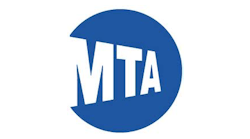MTA Launches New Awareness Campaign
MTA already provides disabled customers “priority seating” on buses and trains; while riders are required to relinquish seats in those areas under federal regulations and MTA rules of conduct, the new courtesy buttons can help riders better identify which customers need seats. The campaign also encourages customers, as a matter of courtesy, to give up any seat — not just those in reserved “priority” areas — to customers wearing an MTA-issued button.
Customers who are pregnant can choose from a “Baby on Board” button or a “Please Offer Me a Seat” courtesy button, which can also be worn by customers who have disabilities and seniors who choose to wear them.
The MTA will distribute buttons to all users of our system and the initiative will be integrated into our existing courtesy campaigns via transit system advertisements and social media.
“Pregnant riders, seniors and those with disabilities often need seats more than others but their condition may not always be visible,” said MTA Interim Executive Director Ronnie Hakim. "We hope this campaign will help their fellow riders to be more willing to offer them a seat without having to ask a personal question first.
“While we continue to designate ‘priority seating’ for riders with disabilities, this is another way to expand the availability of seating for those who need it most,” Hakim added.
Health officials and advocates for transportation and disability praised the initiative as a positive way to help disabled riders and spread awareness that not all physical conditions are clearly visible.
“A little courtesy goes a long way. Providing a seat to a special needs user, without having an awkward conversation, can make a big difference with a small gesture,” Veronica Vanterpool, executive director of the Tri-State Transportation Campaign and MTA board member said of the initiative. "I'm glad the MTA is launching this pilot campaign to remind its customers of priority seating while also explicitly including pregnant women and older adults to the group of special needs transit users."
“The MTA has the ability to change norms around what it means to accommodate and support pregnancies and families on public transit in the United States. This pilot program represents a positive step toward doing so,” said Christine Serdjenian Yearwood, the founder and CEO of UP-STAND, an advocacy group that supports ways to accommodate pregnancies and families through the use of such buttons. "We've seen these kinds of accommodations work to make public transit more accessible for pregnant riders in European and Asian countries. We're thrilled to see the MTA introduce this pilot program for New York residents and to partner with them toward improving accessibility."
“There’s no question that this campaign will help pregnant women, disabled passengers and seniors who use public transit,” New York State Department of Health Commissioner Dr. Howard A. Zucker said. “Those who need it should sign up for a button, and the rest of the riding public should meet this good-faith effort by offering a seat to someone who is wearing one.”
The MTA’s Ronnie Hakim noted that the awareness campaign is part of broader efforts to make the system more accessible.
“The MTA is committed to promoting access to our system for people with disabilities. Over the coming years, this will involve spending billions to make more of our system ADA-accessible through the addition of elevators at stations and focusing on ways we can improve the availability of our existing elevators,” Hakim said. “This awareness campaign is another step we can take to help our riders and to encourage kindness throughout our vast system.”
Transport for London has had a similar program for the London Tube since 2005, with approximately 130,000 of the badges distributed every year. It started with a “Baby on Board” pilot, which was later followed by a pilot for disabled customers. Dutchess of Cambridge Kate Middleton brought international attention to the program when she wore an official “Baby on Board” button in 2013.
The awareness button pilot announced is considered to be the first of its kind in the United States and marks the first time MTA, which runs the largest transportation system in North America, is using buttons as part of a courtesy campaign.


